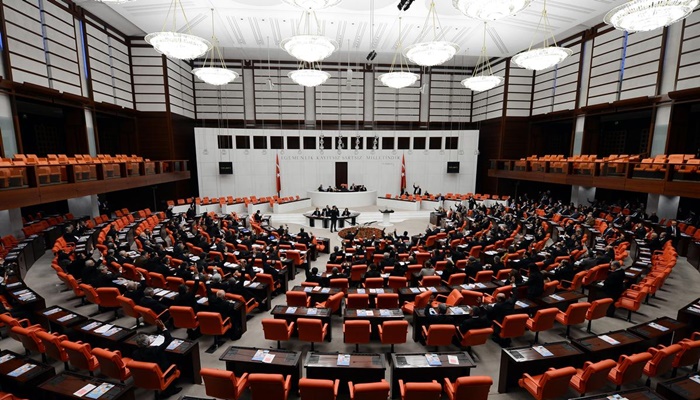The Media Solidarity Group, the Press Council and the Union of Turkish Bar Associations (TBB) have condemned proposed legislation in Turkey that will add to the ability to charge anyone as acting as an “agent of influence,”referring to any individual or group found to be working against national interests under foreign influence, arguing that the law threatens press freedom, democracy and freedom of expression in Turkey, the Gazete Duvar news website reported.
The Media Solidarity Group, which represents several media unions and journalists’ associations, issued a statement on Tuesday arguing that the legislation, if enacted, could criminalize journalistic work under vague definitions. The proposed law, also informally referred to as an “influence peddling” measure, is currently under consideration by the Turkish Parliament. It aims to amend the existing Turkish Penal Code to include unspecified offenses loosely described as working against national interests in support of a foreign entity.
The proposed legislation has been criticized for its potential impact on the work of journalists and civil society. The Media Solidarity Group statement said: “The increasing pressure on journalists and press freedom poses a significant threat to the public’s right to information and freedom of expression.”
They cited recent cases of suppression of the media, including the arrest of journalist Furkan Karabay, a ban on journalist Amberin Zaman’s social media account and an incident in which Hilal Köylü, another journalist, was asked to quit her job following an interview with a political figure. The group said these incidents indicate “growing intolerance and interference in press freedom” and are causing great concern among the public.
The statement referred to Article 26 of the Turkish Constitution, which protects the freedom of individuals to express and disseminate their opinions, and emphasized that this constitutional right is increasingly under threat.
“The right to freedom of expression, which is enshrined in the constitution, is increasingly being restricted and journalists are being deprived of legal protection,” the group said, adding that press freedom laws are necessary to inform the public and reveal the truth. “Journalists must not be criminalized simply for doing their job.”
In its detailed critique, the media solidarity group called the new law a potential tool to criminalize journalism, arguing that the proposed legislation lacks specific definitions. This ambiguity could lead to criminalizing critical media reports on topics such as the economy, public health, defense, technology and public order, posing a “significant threat to press freedom”
“Journalism is not a crime,” the group said.
“The public’s right to information is a fundamental value that we must protect in line with our belief in democracy and the rule of law.” They also called on the government to withdraw all laws that restrict press freedom and impose repressive measures on journalists. “We call on all individuals and organizations to stand up for freedom of expression, the rule of law and the fundamental values of democracy.”
The media solidarity group’s statement was co-signed by prominent media organizations including the Press Council, the Contemporary Journalists Association (ÇGD), the Diplomatic Reporters Association (DMD), the Press Workers Union of Turkey (DİSK Basın İş), the İzmir Journalists Association (İGC) and the Turkish Journalists Union (TGS).
The TBB also spoke out against the draft law, arguing in a statement that the proposal contradicts democratic legal principles. The TBB, which represents bar associations across Turkey, said, “The term ‘strategic interests of a foreign state or organization’ as used in the proposal is a phrase that does not exist in our criminal justice system, allows for arbitrary interpretations and leaves no room for legal predictability.”
The TBB also emphasized that the legal language in the bill includes vague terms, noting that such ambiguous definitions would jeopardize the liberty, security and freedom of expression of individuals.
“We cannot accept the use of such unclear terms in criminal law, especially in a democratic constitutional state where the rights of the individual are protected.”
The TBB statement goes on to say that the bill has been approved by the parliament’s justice committee and could be discussed in a plenary session later this week. The association appealed to lawmakers to reject the proposal and warned of possible human rights violations if the law were to come into force.
Furthermore, the Press Council released a statement on Tuesday evening expressing its concerns. The council warned that the bill could allow government authorities to redefine a journalist as an “agent of influence” under the new standards and target individuals, media organizations or any dissenting group as a potential threat to national security.
“This bill could transform the journalistic mission of reporting truth into a criminal activity, risking imprisonment and judicial reprisal for journalists,” the council said. “The bill is incompatible with a democratic society and violates Turkey’s obligations under the European Convention on Human Rights, including its protection of freedom of thought and expression.” The council also warned that this vague legal framework “could take the shape of a ‘witch hunt’ across society, not only targeting journalists but the public at large.”
The council urged lawmakers to abandon the proposal and uphold the country’s commitments to democratic principles, saying, “We urgently expect the withdrawal of this proposal, purportedly aimed at countering espionage, but which has the potential to devolve into a society-wide witch hunt.”
The draft law has also drawn comparisons to similar legislation in other countries, such as Russia’s foreign agent law, which has been used to suppress civil society and independent media.


